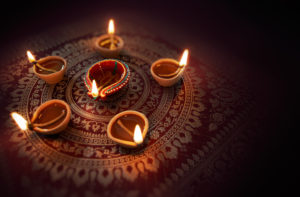
Religion and culture are often closely tied together, so it’s no surprise that many seasonal holidays also hold spiritual significance for their celebrants. A bountiful harvest was regarded as a generous divine gift, usually as a reward for faithful devotion and service. Some autumn celebrations were not only expressions of gratitude toward a civilization’s deities but also expressed hope for prosperity in the upcoming year. The Hindu holiday of Diwali is just one example, but its customs reveal some insight about the people who celebrate them.
Clay Lamps To Light the Way
Besides being one of Hinduism’s most important festivals, Diwali is probably its most recognizable religious holiday to those outside the faith. National Geographic explains that its name comes from two words: “deepa,” which refers to clay lamps lit during the holiday, and “avali,” the rows of lamps left on display. The Encyclopedia Britannica adds that these lamps are placed on the parapets of homes and temples as well as set adrift along rivers and streams. It’s no wonder that the celebration is also called a “festival of lights,” with revelers opening their windows and doors and lighting the lamps to welcome Lakshmi, the Hindu goddess of prosperity, fortune, and wealth.
Five Nights of Celebration
Diwali is typically commemorated as a five-day event. Celebrations in India are enjoyed by Hindus, Sikhs, Jains, and Buddhists. At the same time, Diwali festivities are also observed in nations with sizable Indian communities, including the United Kingdom, Australia, the United States, New Zealand, Canada, Nepal, Singapore, and Trinidad and Tobago.
Diwali festivities will begin on November 5 and end on November 9 in 2018. Since the holiday occurs near the final new moon of the Hindu lunar-based religious year, its start and end dates always change. November 7 will mark the height of the festivities, but each day has its own celebratory customs:
- The first day, also known as Dhanteras, usually calls for cleaning and preparing homes to welcome Lakshmi.
- On the second day, homes are decorated with clay lamps and creative floor designs made with sand, flower petals, colored powders, rice, and flour.
- A special Lakshmi puja is held on the third day, followed by feasting and fireworks.
- Gifts are exchanged on Padwa, the fourth day of the festival and the first day of the new upcoming year.
- The final day is meant for celebrating one’s siblings by sharing a meal and giving gifts.
The Reasons for the Season
Although it may have originated as a harvest festival, other narratives have been woven into the Diwali holiday. Among Hindus in India, devotion to Lakshmi and wishes for success in the new year are the key focuses. Meanwhile, Bengali celebrants honor Kali, Sikhs commemorate the return of Guru Hargobind from captivity, and Jains pay homage to Mahavira, a key religious figure said to be the last one of the faith to attain nirvana.
Even among Hindus, the festival can pay tribute to many different religious and cultural events. For example, the second day marks Kali and Krishna’s defeat of Narakasura, a pious king transformed into a demon due to his own hubris. Gambling is also a favorite pastime during the holiday to commemorate the dice games played between Shiva and Parvati or Krishna and Radha. Vishnu’s victory over Bali, another demon king, and Krishna prevailing over the thunder god Indra are also prominently commemorated in various parts of India.
“From Darkness, Lead Us to Light”
Diwali began as a distinctly Indian holiday, but its influence reaches well beyond the subcontinent thanks to the Indian diaspora settling and making new lives in many nations around the world. Like many autumn seasonal festivals, Diwali celebrations reveal gratitude towards the divine, desires for prosperity, and renew hope for the future.

